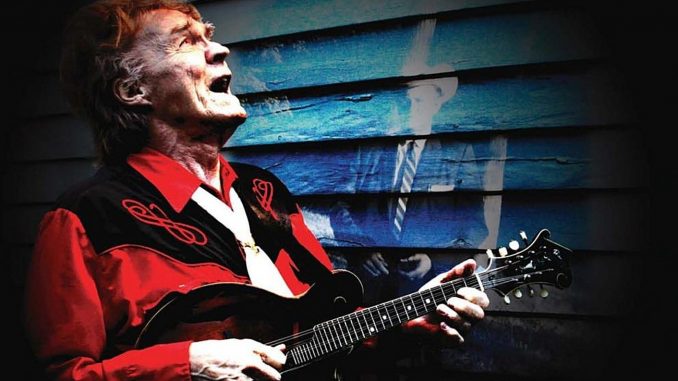
The Oppenheimer of bluegrass mandolin.
On the 26th of April, 2024, the bluegrass world lost one of its true innovators when Frank Wakefield died at his home in Sarasota Springs, NY. Bill Monroe may be the founding father of bluegrass mandolin but Frank Wakefield is the pathfinder who laid the trail that the likes of David Grisman, and the new grass players of the ‘70s right up to the young bluegrass musicians of today followed. From a modern-day perspective, it is sometimes easy to forget how ubiquitous the mandolin was to the music of the 1920s and 1930s following the innovations made by the Gibson musical instrument company to what had been seen as a classical instrument. It featured in the pop and jazz music of the day and became a mainstay of the emerging strands of country music including western swing and the “brother acts” featured on the radio of the 1930s. Frank Wakefield had the knowledge and the chops to absorb the lessons for Bill Monroe and to create his own innovative style that took inspiration from the history of the mandolin in music, including classical music.
Frank Delano Roosevelt Wakefield was born in Emory Gap, Tennessee, on June 26 1934. Rural life in the Depression was tough and homemade music and the radio were the main sources of entertainment and the young Frank took an interest in the guitar and harmonica, and listened to hillbilly bands on the family radio, The family moved to Dayton, Ohio, and a teenage Frank Wakefield got his first mandolin at the time that Bill Monroe and his blues-influenced mandolin was heavily featured on the radio. It was in Dayton that he met up with Red Allen, one of the greatest bluegrass singers, and the pair made a series of recordings over the years that influenced the next generation of young more urban players.
After playing with the likes of Jimmy Martin and The Stanley Brothers, Frank Wakefield moved to the Washington-Baltimore area which was a hotbed of Northern bluegrass. It was in the 1960s when he actively started developing his own style after Bill Monroe told him “You play my style about as good as I do; what you have to do now is get your own style.” Frank joined up again with Red Allen playing the local clubs and on local radio station WDON and he met a young David Grisman who became a protégé and produced some of the duo’s recordings. Frank Wakefield then joined the Greenbriar Boys a folk-bluegrass band who were very popular at the time.
Frank Wakefield left the Greenbriar Boys in 1970 and started his solo career with one of the first recordings made by the then new Rounder Records in 1972 where he was backed by members of the legendary Country Cooking. His second solo album was recorded for the Grateful Dead’s Round Records and featured David Nelson of the New Riders of the Purple Sage, stand-up bassist Pat Campbell and bluegrass musicians Chubby Wise and Don Reno. The album. ‘Pistol Packin’ Mama’ was put out under the name of The Good Old Boys and was produced by Jerry Garcia, who sat in with the band when they toured around the album. Frank Wakefield continued working during the ‘80s and ‘90s, releasing a series of albums from the late ‘90s on Patuxent Music after his profile was raised in 1999 by an appearance on David Grisman’s ‘Bluegrass Mandolin Extravaganza’, for which he also won a Grammy.
As well as his musical and mentoring achievements, Frank Wakefield was known for his mischievous sense of humour, which further endeared him to fellow musicians and fans. His influence on later generations of mandolin players is beyond doubt, and David Grisman probably gave the best description of Frank Wakefield’s achievements when he said, “Frank was the first mandolin player to transform the bluegrass energy of Bill Monroe into something new. He split the bluegrass mandolin atom.” Anyone who enjoys bluegrass music, and particularly bluegrass mandolin, should raise a proverbial or real glass to the memory of Frank Wakefield.


